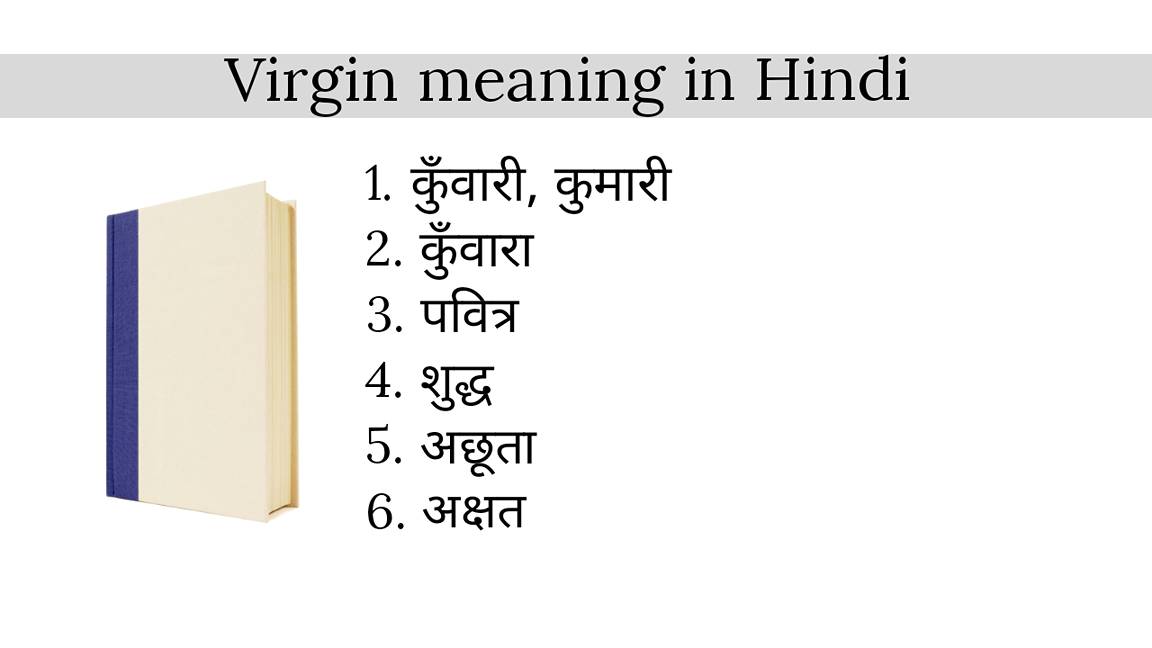
Virgin Meaning in Hindi
The word “virgin” means kunwari for females and kunwara for males in Hindi. These terms refer to he/she has not engaged in sexual intercourse.
Virgin history
The concept of virginity has been present in various cultures throughout history and has often been associated with notions of purity, chastity, and sexual morality. However, it’s important to note that ideas and practices surrounding virginity have varied across different societies and time periods.
In ancient civilizations such as ancient Greece and Rome, virginity was often highly valued, particularly in women. Women’s virginity was seen as a symbol of their purity and integrity, and it was expected that they would remain chaste until marriage. Violations of female virginity before marriage were sometimes met with severe consequences, including societal shaming, punishment, or even death in extreme cases.
In many traditional societies, virginity was considered a prerequisite for marriage and was often a matter of family honor and reputation. The virginity of brides was sometimes verified through physical examinations or the presence of a bloodstain on the wedding sheets after the consummation of the marriage.
Over time, societal attitudes towards virginity have shifted, influenced by changing cultural, social, and moral values. In many contemporary societies, the emphasis on virginity has diminished, and individuals’ sexual choices and experiences are regarded as personal decisions. Discussions around virginity have become more nuanced, and the importance placed on it varies significantly depending on cultural, religious, and individual perspectives.
It is important to recognize that the concept of virginity is subjective and can carry different meanings and implications for different people and communities. It's crucial to approach the topic with sensitivity, respect, and an understanding of diverse cultural and individual perspectives.
How to know someone is virgin?
Knowing whether someone is a virgin or not is a personal matter that should be respected and not assumed or judged by others. Virginity is a cultural concept that can vary across different communities and individuals. Till now there is no definitive physical or medical test to determine virginity.
Virginity is often associated with the absence of sexual experience. It is based on personal beliefs, values, and individual experiences. It is not a good sign to make assumptions about someone’s sexual history or to try to determine their virginity without their consent.
It's essential to respect people’s privacy, autonomy, and personal boundaries regarding their sexual experiences. Instead of focusing on someone’s virginity, it is more important to foster open and respectful communication about consent, sexual health, and relationships.
Can virginity break without Sexual intercourse?
The concept of virginity traditionally refers to someone who has not engaged in sexual intercourse. However, it’s important to note that “virginity” is a social and cultural construct, and the definition can vary across different societies and individuals. In some cultures, the breaking of a hymen (a thin membrane in the vagina) has been associated with the loss of virginity, but this understanding is not universally applicable or accurate.
It's worth mentioning that the hymen can be stretched, torn, or otherwise altered through various activities other than sexual intercourse. For example, physical activities such as sports, using tampons, or even certain medical conditions can cause the hymen to change. Therefore, the presence or absence of an intact hymen does not necessarily indicate a person’s sexual history or virginity.
Ultimately, the determination of virginity is a personal matter and can depend on an individual’s own beliefs, values, and definitions. It’s important to approach discussions around virginity with respect for individual autonomy and without making assumptions or judgments about others.
The medical importance of the virgin
From a medical standpoint, virginity itself does not hold any inherent medical importance. The concept of virginity is a social and cultural construct rather than a medical or physiological condition.
However, certain medical discussions and practices may intersect with the concept of virginity, particularly in the context of sexual health. Here are a few points to consider:
Sexual Health Education:
Discussions surrounding virginity often coincide with sexual health education. It is important for individuals, regardless of their sexual history, to have access to accurate information about contraception, sexually transmitted infections (STIs), consent, and safe sexual practices.
Hymen and Sexual Health Examinations:
In some cultural contexts, the condition of the hymen has been linked to virginity. However, it’s crucial to note that the presence, absence, or condition of the hymen does not determine an individual’s sexual history or health. Medical professionals should provide education and guidance that is free from judgment or assumptions regarding a person’s sexual activity.
Sexual Dysfunction or Pain:
Some individuals, regardless of their sexual history, may experience sexual dysfunction or pain during intercourse. These concerns should be addressed with empathy and respect by healthcare providers, who can offer appropriate medical advice and potential treatment options.
It Is important to approach discussions around virginity from a holistic perspective that includes physical, emotional, and mental well-being. In any medical context, it is crucial to respect patient autonomy, provide non-judgmental care, and ensure open and informed communication.

Comments (0)